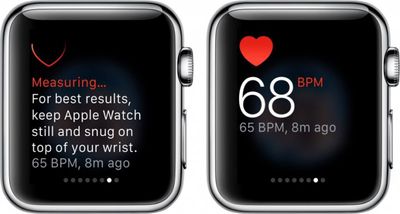Apple is planning to work with Stanford and telemedicine vendor American Well to determine whether the heart rate sensor in the Apple Watch can be used to detect abnormal heart rhythms and common heart conditions, reports CNBC.
An Apple Watch, if able to accurately detect arrhythmias, or abnormal heart patterns, could identify patients that are at a high risk of atrial fibrillation or similar conditions. Heart arrhythmias aren't always symptoms of a serious disease, but Apple Watch owners could find out about a problem from the Apple Watch and then get it checked out at a doctor if the device is determined to accurately predict heart problems.

"Atrial fibrillation is a common rhythm disorder and knowing someone has it is medically useful because those people might need specific treatments," said Bob Wachter, chair of the Department of Medicine at the University of California San Francisco.
A study conducted by the University of California, San Francisco and the team behind the Cardiogram app previously determined that the Apple Watch was able to detect abnormal heart rhythms with 97 percent accuracy. Apple could get even better results as it has access to raw data.
Just today, Apple CEO Tim Cook talked about Apple's health interests in an interview with Fortune. He said Apple is "extremely interested" in health, and that it represents a major business opportunity.
If you look at it, medical health activity is the largest or second-largest component of the economy, depending on which country in the world you're dealing with. And it hasn't been constructed in a way where the focus at the device level is making great products from a pure point of view. The focus has been on making products that can get reimbursed through the insurance companies, through Medicare, or through Medicaid. And so in some ways we bring a totally fresh view into this and say, 'Forget all of that. What will help people?'
Cook also said that Apple has been surprised to learn how the heart rate monitoring in the Apple Watch has already been helping people. Many people collect data with the Apple Watch, notice something amiss, and then go to the doctor to get it checked out. "A not-insignificant number have found out if they hadn't come into the doctor they would have died," said Cook.
Apple's study in partnership with American Well and Stanford is set to begin later this year, according to CNBC's sources.






 ('https://www.macrumors.com/2017/09/11/apple-watch-stanford-abnormal-heart-rhythms/')
('https://www.macrumors.com/2017/09/11/apple-watch-stanford-abnormal-heart-rhythms/')













